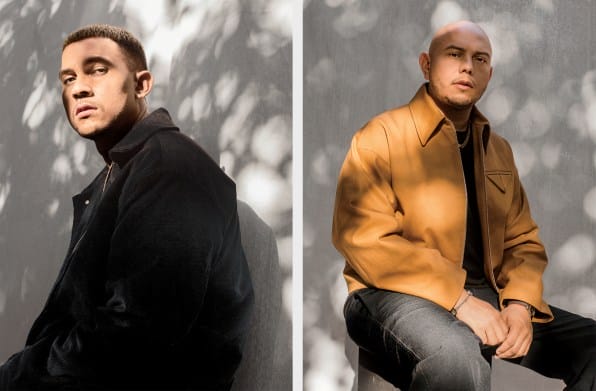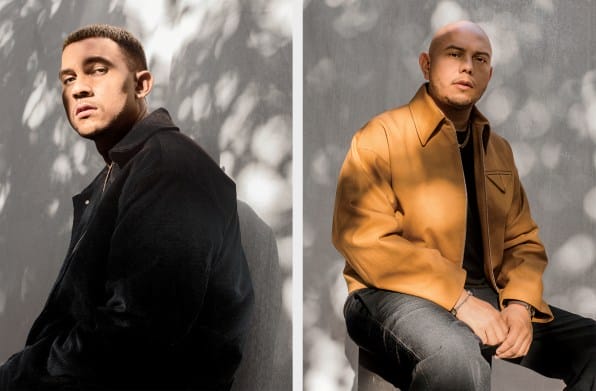The COVID-19 pandemic proved to be a catalyst for the music industry to enhance live-streaming capabilities and create frictionless payment options for artists. Companies also found dynamic ways to amplify Black and Latin cultures and expanded streaming to overlooked countries. Here are the 10 companies that have elevated the music industry in ways that will have a lasting impact beyond the economic and social tumult of 2020.

1. Neon16
For empowering urban Latin culture across entertainment
Music producer Tainy has been a pioneer in reggaeton for more than a decade, producing chart topping hits for artists including Cardi B, J Balvin, and Bad Bunny. Last year, he teamed up with former Roc Nation exec Lex Borrero to create Neon16, a talent incubator and music label run in partnership with Interscope Records. “It’s pushing our culture forward,” Tainy says. In addition to working with up-and-coming Latin talent including Dylan Fuentes, Kris Floyd, and Álvaro Díaz, Neon16 is making good on its motto to “fear nothing, impact everything” by expanding its mission to elevate urban Latin culture across live events, TV and film, and gaming. Neon16 has curated and hosted events, such as the History of Reggaeton Art Exhibit during Art Basel Week and a celebrity e-sports tournament. It also led a Series A for the e-gaming startup ReKTGlobal, alongside other investors including DJ Steve Aoki and Live Nation. And Ntertain Studio, the company’s film, TV, and digital media arm, is developing scripted and unscripted projects, as well as podcasts that will begin to roll out in 2021. “It’s not just cool branding and great music—it’s utilizing our platform for teaching the youth a different way to do the business,” Borrero says. For example: “One of the things that you see a lot is the big producer taking all the credit. We make sure that everyone gets paid fairly and gets the proper credit. From the smallest producer to Tainy, everyone gets the same love and the same press.”
2. Verzuz
For pitting musicians against each other in a way that everyone wins
What started as friendly competition during quarantine on Instagram Live between veteran music producers Timbaland and Swizz Beatz quickly transformed into one of 2020’s biggest breakouts in entertainment. Verzuz is a music battle platform that has legendary R&B and rap artists face off against each other, hit for hit. Battles have featured Brandy vs. Monica; DMX vs. Snoop Dogg; Gladys Knight vs. Patti LaBelle; Erykah Badu vs. Jill Scott; and Jeezy vs. Gucci Mane, which was Verzuz’s most watched battle to date, drawing more than 9.1 million viewers across all platforms. In July, Verzuz made a non-exclusive distribution deal with Apple to simulcast battles on Apple Music and Apple TV Plus and Instagram Live. Verzuz has also served as a vehicle to drive streaming numbers and renewed interest for artists who may have peaked commercially years ago, which has been dubbed “The Verzuz Effect.”
3. Parkwood Entertainment
For elevating Black culture
Beyoncé Knowles-Carter’s management and entertainment company Parkwood Entertainment produced the groundbreaking visual album Black Is King on Disney Plus, a companion film to 2019’s Lion King soundtrack The Lion King: The Gift. Black Is King contextualized the African diaspora in high art and fashion, elevating Black culture and imagery, not to mention Disney Plus’s subscriber count when it premiered in July. According to global fashion search engine Lyst, searches for French fashion designer Marine Serre’s crescent moon bodysuit, worn by Beyoncé in Black Is King, skyrocketed 426% in the 48 hours after the film’s release, making it Lyst’s “most popular design of 2020.” Parkwood Entertainment also spearheaded the rollout of the label’s buzziest act, Chloe x Halle, and their debut LP Ungodly Hour. The COVID-19 pandemic restricted in-person promotion and performances, which led to a series of highly produced virtual numbers aired on the Today show, Jimmy Kimmel Live!, and during Billboard’s Women in Music event.
4. BeatStars
For ensuring that the beats go on
BeatStars is an online marketplace for producers to sell their beats to artists. The company got a major boost after it was discovered that the beat used for rapper Lil Nas X’s history-making 2019 track “Old Town Road” came from the platform. But BeatStars has proven it’s no one-hit wonder. The company inked a deal with Sony/ATV that will open a pipeline to the label for publishing and administration services for BeatStars producers and artists. BeatStars’ community has grown to more than 2 million users receiving more than $100 million in payouts.
5. Harmonix Music Systems
For remixing creativity in gaming
Harmonix revolutionized music-based gaming with its breakout hits Guitar Hero and Rockband,, which required gamers to play instruments in time with the notes of popular songs scrolling across the screen. But in Harmonix’s latest rhythm game, Fuser, players take an active role in creating the music by remixing up to four tracks at a time. The results are inventive mashups that seamlessly blend together thanks to technology on the backend that automatically adjusts the key, tempo, etc. of each track. This way, Cardi B’s “Bodak Yellow” mixed with Dolly Parton’s “Jolene,” Coldplay’s “Clocks,” and Rick Astley’s “Never Gonna Give You Up,” just might slap.
6. Bandcamp
For putting musicians first
Since launching in 2008, Bandcamp, the online platform where musicians can promote their work and sell merch, has been a favorite among artists, particularly for its revenue model, which takes only 10-15% on digital items and 10% on physical goods. In response to the COVID-19 pandemic, Bandcamp went further, waiving its cut one Friday every month through 2020, so that artists received 100% of the profits. Also, recognizing that in-person concerts were no longer feasible, Bandcamp introduced Bandcamp Live, a ticketed live streaming service that’s fully integrated into the platform and makes merch sales seamless.
7. Dolby
For democratizing studio quality sound
Dolby, a leader in audio across entertainment, introduced a suite of tools and upgrades aimed at improving the quality of recordings and livestreams. Last year, Dolby released recording app Dolby On, which received more than 1 million downloads. As the COVID-19 pandemic pushed more people to find ways to replicate the live experience, Dolby On expanded to include live streaming capabilities that focus on sound-related features, including noise reduction and stereo widening. Dolby also partnered with music distribution and streaming service SoundCloud to create Mastering on SoundCloud, Powered by Dolby. Leveraging Dolby’s new API platform Dolby.io, the SoundCloud product filters uploaded tracks through Dolby’s automatic audio mastering technology.
8. Royalty Exchange
For creating a marketplace for royalties
Royalty Exchange is a marketplace allowing artists who are earning royalties to sell them to investors during online auctions as a way to raise funds. To date, Royalty Exchange has facilitated more than 1,000 transactions, funneling more than $90 million to artists. In 2020, Royalty Exchange expanded its services to accommodate sellers who were wary of auctions because there’s no price guarantee, with bids starting, and possibly staying, low. The result was the eXchange, a Craigslist-style option where sellers can set their fixed prices for buyers to peruse and purchase.
9. Audiomack
For accommodating listeners in Africa, and musicians, too
For Audiomack, a music streaming and discovering platform with more than 16 million monthly active users, 2020 represented a strategic play into key African territories. According to PricewaterhouseCoopers annual Entertainment and Media Outlook report, music streaming and sales across Nigeria, South Africa, Kenya, Tanzania, and Ghana are expected to show considerable growth over the next five years. That upward trend directly coincides with Audiomack opening its first international office in Lagos in 2020, and signing a licensing deal with Warner Music making the label’s catalogue available across Africa, Jamaica, and Canada, for the first time. Audiomack will also support Warner Music’s A&R department with data insights to guide talent discovery, as well as aid in pushing African artists on Warner Music’s label into western markets.
10. Stem
For getting artists paid during the pandemic
As a music distribution platform, Stem has made it a priority to ease pain points for artists by simplifying managing contracts, getting music onto platforms, and, most importantly, making sure artists get paid. In 2020, Stem introduced Scale, a funding resource that provides cash upfront in exchange for a fixed percentage of future earnings until the advance is paid off. (It is meant to keep artists from feeling forced into restrictive label contracts due to the need for cash.) In addition to making its terms transparent, Scale also allows artists to maintain full ownership of their masters. Stem had been developing Scale before the COVID-19 pandemic, but it couldn’t have come at a better time to give independent artists a much needed lifeline. Stem has allocated $100 million to offer in advances and has given out $1.6 million since the pandemic.
